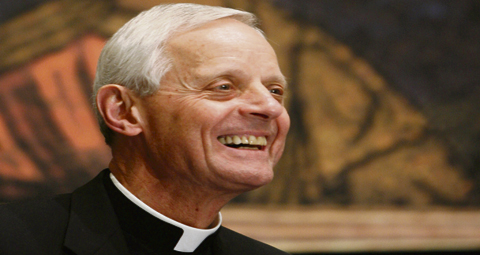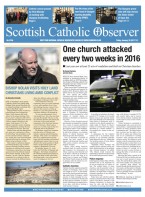BY Liz Leydon | October 11 | ![]() 1 COMMENT
1 COMMENT ![]() print
print

Cardinal Wuerl: Why hope springs anew for the Church
SCO editor LIZ LEYDON, discovered US Cardinal Donald Wuerl’s Scottish connection, and a great deal more on New Evangelisation, Liturgy, religious liberty and the US ordinariate, when she caught up with the Archbishop of Washington DC during his visit to recent Scotland
The arrival of late Indian summer sunshine in Stirling provided Cardinal Donald Wuerl, Archbishop of Washington DC, with the ideal backdrop to talk about ‘the new Spring, the new birth,’ for the Church that New Evangelisation is heralding.
“I think this is a whole new moment in the life of the Church,” Cardinal Wuerl said. “There is a generation coming along that realises there is something missing, that the secular and the material cannot answer every question. And so this is our time to tell them all over again about Jesus.”
After two informal and enlightening sessions with the National Conference of Priests and Permanent Deacons of Scotland on September 28, Cardinal Wuerl, 70, agreed to expand on the topic—and on several related areas—for the SCO.
Early career
Cardinal Wuerl was ordained a priest for Pittsburgh on December 17, 1966. Because the then Cardinal Wright of Pittsburgh had to use a wheelchair due to his severe arthritis in 1978, Fr Wuerl, as Cardinal Wright’s secretary, was one of three non-cardinals permitted inside the conclave that chose Karol Wojtyla as Pope John Paul II, the Pope who went on to call for New Evangelisation in countries where Catholicism was showing signs of decline.
One of the SCO’s first discoveries when talking to Cardinal Wuerl was his connection with Scotland. Although prior to last week he had not visited since his younger days as a student, when he was named a bishop on St Andrew’s Day in 1985, his first assignment was as titular bishop of Rosemarkie, an extremely ancient village looking east along the Moray Firth in Scotland.
While his return to Scotland has not disappointed him, he sees parallels between many of the issues Scottish Catholics are facing and those in his own Archdiocese of Washington DC, which includes the seat of political power in the US.
When asked for his advice on opposing same-sex marriage and protecting Catholic adoption agencies, issues he has championed in Washington DC, the cardinal was forthright.
“These issues are not unique to Scotland,” he said. “We have faced them in the US for that matter, and seen them across the western world.
“There is a need to sustain the Church’s religious liberty no matter what civil law chooses to enact. Catholics, people of any religion, must be free to exercise their conscience.”
New evangelisation
Pope Benedict XVI, who established a Pontifical Council on New Evangelisation, has called on Catholics to ‘re-propose’ the Catholic Faith, according to Cardinal Wuerl.
“At the heart of the New Evangelisation is the need for each one of us believers to renew and deepen our own Faith so that we are confident enough to share it with others,” he said
The cardinal said the reason he wrote his New Evangelisation pastoral letter—Disciples of the Lord, sharing the Vision—last year was to highlight that ‘what we need to do is to recognise that we do have a significant number of people right close at home who have drifted away from the Faith.’
“They should be the object of our efforts, our missionary efforts, our outreach, our evangelisation efforts,” he said.
He acknowledged there is an acute need today for Catholics in the UK, as in the US, to be ‘missionaries in our own countries.’As an answer to secularism and relativism, Cardinal Wuerl sees great potential in New Evangelisation.
“We have to recognise that the whole atmosphere around us is secular and heavily materialistic,” he said. “The New Evangelisation is all about recalling for people the spiritual dimension to their existence,” he said. “Each one of us is called to a relationship with God. Each one of us is invited to encounter the Risen Lord. It is precisely in that relationship with God that we find our true meaning and joy and the goal of life.”
Education
Adding that the New Evengelisation is addressing what has ‘eclipsed our spiritual dimension,’ he said that the dichotomy between faith and reason limits ‘the whole richness the spiritual dimension of our life brings’ and that it is a challenge that must be overcome.
“The is a need for more than just the physical science to answer the great questions of life,” he said. “How shall I live, what are the values that should motivate my life, these are not answerable from the physical sciences.
“Part of the intellectual tasks of the New Evangelisation is to lift the horizons so they include much more than just the physical sciences.”
The cardinal, chairman of the board of directors of the National Catholic Educational Association in the US, added that adult faith foundation ‘really is and has to be a focus in the Church today’ and that the RCIA was a ‘great tool’ in bringing people to an adult understanding of their Faith.
While he does not know if he will be called to represent the US at next year’s Synod of Bishops on New Evangelisation, the cardinal is heading to Rome on October 14 for a discussion called by Pope Benedict XVI around the ‘formation of evangelisers for the New Evangelisation.’
Ordinariate
Cardinal Wuerl was interested to discover that the Scottish hierarchy welcomed the first Scottish Episcopal Church clergy conversion under the personal Ordinariate of Our Lady of Walsingham earlier this year when Bishop Philip Tartaglia of Paisley ordained Fr Len Black at St Mary’s, Greenock. As Vatican delegate for the US ordinariate, he has been watching developments in the UK with great interest and he is confident that the establishment of the US ordinariate is imminent this autumn.
“I am hoping that it will happen in this calendar year that an ordinariate will be announced,” the cardinal said. “There will be a time lag between the Holy See announcing that it intends to establish an ordinariate and the actual date of its implementation but I am still hopeful that, before this year is out, a US ordinariate will be established.
“We are moving forward with the examination of the case of at least 100 clergy and several thousand Anglicans who want to come into the Catholic Church as groups,” the cardinal said. “In two weeks time I will be receiving an entire parish into the Church and confirming around 120 people. This is being done in anticipation of the ordinariate.”
A great deal of work has already been done in the US on the ordinariate, he told the SCO, and this work, supported by the US Bishops’ Conference, will lead to formally setting up the US ordinariate.
“We have had wonderful accord between the Episcopal Diocese of Washington, and its bishop, and our archdiocese,” he added before confirming that the discussions have included plans for the transfer of property.
Liturgy
Cardinal Wuerl co-wrote the book The Mass—a step-by-step walk through the parts of the celebration—in anticipation of the introduction of the new English translation of the Roman Missal this year (which is currently underway in Scotland, as it is in the US.)
He views the new translation as a fresh opportunity for discussion, renewal and growth in parishes, diocese and countries.
“In the US the emphasis… is to use this as an opportunity to help people grow in their understanding of what is happening on the altar, what the Eucharist is all about,” he said.
The change in words is incidental, he added, the important thing is that ‘we know why we are there and what is happening.’
Returning to the message of Pope Benedict calling Catholics to ‘re-propose’ the Catholic Faith, the preparations for the new translation’s formal introduction at Advent are ‘a chance to do that,’ according to Cardinal Wuerl.












I wonder if his eminence cardinal wuerl has a cafe sharing the entrance of the cathedral in washington, or has jazz on the alter as we have in edinburgh?
Evangelization will be supported, when restoration of the respect due to the sacred place where the Eucharistic Lord is, is restored. This won’t happen at present, sadly.